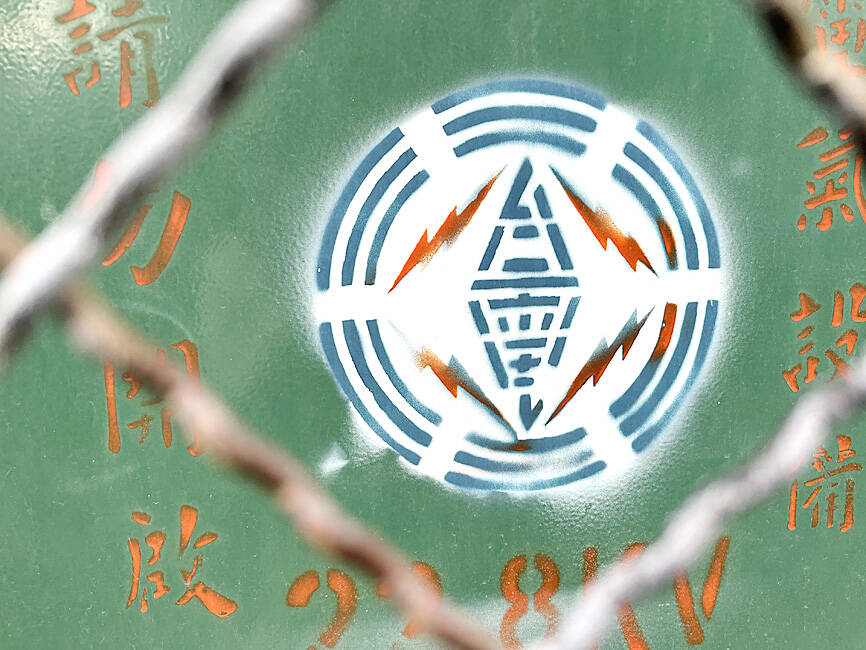The government plans to spend more than NT$100 billion (US$3.14 billion) shoring up the financial soundness of Taiwan Power Co (Taipower), the Executive Yuan said yesterday, adding that the expiration date for tax reduction measures for bulk materials would be extended from next month to June.
Executive Yuan spokesperson Lin Tzu-luen (林子倫) said the two measures are part of the government’s plan to avoid a surge in consumer prices that could be triggered by an electricity rate hike.
The state-run energy company had announced earlier this year that it is scheduled to increase electricity rates next month after accumulating a financial loss topping NT$385 billion.

Photo: Liao Chia-ning, Taipei Times
Premier Chen Chien-jen (陳建仁) said at the weekly Cabinet meeting that countries around the world have adjusted electricity rates in response to a dramatic rise in international fuel prices caused by the Russian invasion of Ukraine, Lin said.
Taiwan has adopted a year-by-year approach to adjusting electricity rates to minimize the impact on consumer prices, Chen said.
Vice Premier Cheng Weng-tsan (鄭文燦) is to preside over a meeting today on stabilizing consumer prices, in which he is to announce that the government would extend the expiration date of tax-reduction measures for mining products, cereals and other bulk materials from next month to June, Lin said.
The funding that would be used to support debt-ridden Taipower is to come from last year’s budget surplus, Lin said.
“We are aiming to appropriate more than NT$100 billion [to Taipower], but the actual amount would not be finalized until after a more detailed calculation,” he said.
“We will also wait until the National Audit Office completes the audit of the central government’s general financial statement by the end of July to decide whether the funding should be listed as a special budget or a supplementary budget to be added to this year’s general budget plan,” he added.
As the new government led by president-elect William Lai (賴清德) is to take office on May 20, the funding plan for Taipower would be presented by the new Cabinet.
Hsia Yu-chuan (夏峪泉), chief of electricity development and management division under the Ministry of Economic Affairs’ Energy Administration, said that rates would first be deliberated by the electricity price review committee, which convenes twice a year.
“In principle, electricity rates would be set in ways that would not cause inflation, but would help conserve energy, reduce carbon emissions and cover operational costs. However, the main point is that it must not lead to inflation,” Hsia said, adding that the electricity rate adjustment has been proceeding in a very detailed manner.
Local government officials and lawmakers across party lines have asked that the average electricity rate increase be limited to 12 percent to avert inflation, Cabinet officials said.
Meanwhile, Lin rejected a report that the government might levy a war tax.
“The government has regularly held meetings on military mobilization as well as military exercises and simulations to ensure the safety of our nation. We are not levying a war tax to raise military funds,” he said, adding that any further announcement from the Executive Yuan would come from him.

Left-Handed Girl (左撇子女孩), a film by Taiwanese director Tsou Shih-ching (鄒時擎) and cowritten by Oscar-winning director Sean Baker, won the Gan Foundation Award for Distribution at the Cannes Critics’ Week on Wednesday. The award, which includes a 20,000 euro (US$22,656) prize, is intended to support the French release of a first or second feature film by a new director. According to Critics’ Week, the prize would go to the film’s French distributor, Le Pacte. "A melodrama full of twists and turns, Left-Handed Girl retraces the daily life of a single mother and her two daughters in Taipei, combining the irresistible charm of

A Philippine official has denied allegations of mistreatment of crew members during Philippine authorities’ boarding of a Taiwanese fishing vessel on Monday. Philippine Bureau of Fisheries and Aquatic Resources (BFAR) spokesman Nazario Briguera on Friday said that BFAR law enforcement officers “observed the proper boarding protocols” when they boarded the Taiwanese vessel Sheng Yu Feng (昇漁豐號) and towed it to Basco Port in the Philippines. Briguera’s comments came a day after the Taiwanese captain of the Sheng Yu Feng, Chen Tsung-tun (陳宗頓), held a news conference in Pingtung County and accused the Philippine authorities of mistreatment during the boarding of

88.2 PERCENT INCREASE: The variants driving the current outbreak are not causing more severe symptoms, but are ‘more contagious’ than previous variants, an expert said Number of COVID-19 cases in the nation is surging, with the Centers for Disease Control (CDC) describing the ongoing wave of infections as “rapid and intense,” and projecting that the outbreak would continue through the end of July. A total of 19,097 outpatient and emergency visits related to COVID-19 were reported from May 11 to Saturday last week, an 88.2 percent increase from the previous week’s 10,149 visits, CDC data showed. The nearly 90 percent surge in case numbers also marks the sixth consecutive weekly increase, although the total remains below the 23,778 recorded during the same period last year,

The Chinese Communist Party (CCP) is pushing for residents of Kinmen and Lienchiang counties to acquire Chinese ID cards in a bid to “blur national identities,” a source said. The efforts are part of China’s promotion of a “Kinmen-Xiamen twin-city living sphere, including a cross-strait integration pilot zone in China’s Fujian Province,” the source said. “The CCP is already treating residents of these outlying islands as Chinese citizens. It has also intensified its ‘united front’ efforts and infiltration of those islands,” the source said. “There is increasing evidence of espionage in Kinmen, particularly of Taiwanese military personnel being recruited by the